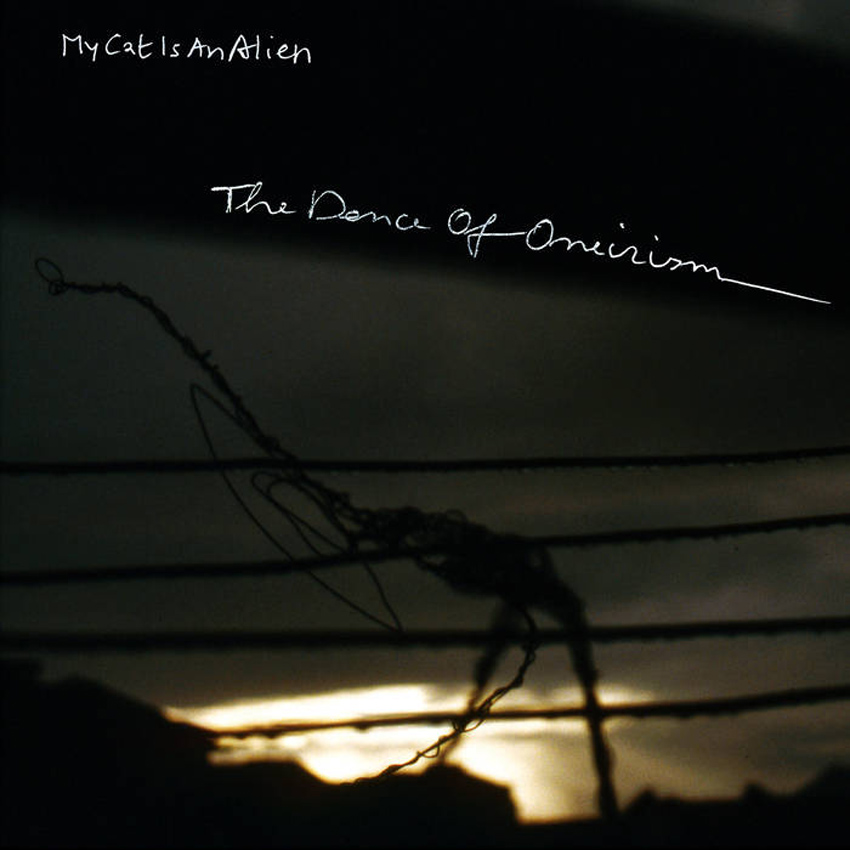My Cat is an Alien, "The Dance of Oneirism"
 The Opalio Brothers have been on quite a hot streak in recent years, as both Psycho-System (2013) and Abstract Expressionism for the Ears (2014) were massive, tour de force plunges into hermetic, all-consuming, and completely otherworldly psychedelia.  The Dance of Oneirism masterfully continues the distillation of MCIAA's ever-evolving and singular vision, weaving its eerie, lysergic, and wonderfully disorienting spell in just under a hour (remarkably concise, given the duo's history).  As expected, it is yet another near-masterpiece of insular and visionary outsider genius and emphatically reaffirms my belief that absolutely nobody goes deeper or is more intent on scrambling minds than Roberto and Maurizio Opalio.
The Opalio Brothers have been on quite a hot streak in recent years, as both Psycho-System (2013) and Abstract Expressionism for the Ears (2014) were massive, tour de force plunges into hermetic, all-consuming, and completely otherworldly psychedelia.  The Dance of Oneirism masterfully continues the distillation of MCIAA's ever-evolving and singular vision, weaving its eerie, lysergic, and wonderfully disorienting spell in just under a hour (remarkably concise, given the duo's history).  As expected, it is yet another near-masterpiece of insular and visionary outsider genius and emphatically reaffirms my belief that absolutely nobody goes deeper or is more intent on scrambling minds than Roberto and Maurizio Opalio.
"Oneirism" is defined by the Merriam-Webster medical dictionary as "a dreamlike mental state experienced while awake," which also seems like quite an apt description My Cat is an Alien's career as a whole.  Oneirism is basically their natural state, but now I guess there is metaphorical dancing involved as well.  In any case, the oneirism on this particular album is induced primarily by Roberto Opalio’s self-made "alientronics," which weave a queasily twinkling and buzzing web of cold electronic tones throughout the album.  While there are ostensibly five different numbered pieces, The Dance of Oneirism is best understood and experienced as a whole, consisting of multiple spontaneously composed variations on a theme recorded over two days in the brothers' Western Alps studio.  Explaining the central theme is a bit tricky though, as it is a mixture of mood and complex textures rather than anything resembling a conventional structure or recurring melody.  Instead, the vein that runs throughout The Dance of Oneirism is merely the slow pulse of Roberto’s psycho-active electronics coupled with his spectral and sighing wordless vocals.  While that certainly creates an appealingly woozy and disquieting atmosphere, the Opalios are not so much a musical entity so much as a pair of psychonauts who use music as the tool for their ritualistic altered state of unreality.
The differences between the various pieces occur primarily in the periphery and in the alternately stuttering or throbbing undercurrent.  The most divergent of the lot is the uncharacteristically brief "The Dance of Oneirism #4," which boasts a stark and lurching drum machine rhythm and pushes the alientronics into the background to make room for a host of spacey whooshes and crackling static (presumably deep space transmissions).  In general, however, Roberto's buzzing and hissing electronic reverie is enhanced by Maurizio's battery of unusual string instruments, which provide an effectively sharp and earthbound foil to the dream-like nimbus of drifting bleeps, buzzes, and hums.  Naturally, Maurizio's homemade pocket harp and "self-made double-bodied string instrument" do not do anything as mundane as play chords or melodies–they too are employed in an entirely textural way, sounding like everything from broken, rusty, and distant church bells (or chimes) to a lazily plucked and detuned tambura.  Significantly, these five pieces do not quite evolve so much as sustain a vibrantly hallucinatory stasis: any sort of escalating density or compositional arc is merely a byproduct of their efforts to maintain a rich and multilayered alien headspace.
Notably, The Dance of Oneirism is largely impervious to any sort of normal critique, as what the Opalios are trying to do is so far outside the norm (even by experimental music standards) that common barometers of quality are mostly irrelevant. No one else is doing anything even remotely like this and My Cat is an Alien's only discernable influence at this point in their career seems to be themselves.  That said, all of the normal caveats for an MCIAA album apply just as much as ever: Oneirism offers absolutely nothing at all for the casual listener to grab onto, such as songcraft, hooks, power, or conventional beauty.  Instead, the Opalios expect prospective listeners to trust them enough to give both themselves and their complete attention over to a sustained dive into some very deep, dark, and strange waters. More than almost any other artist, MCIAA demand that the listener meet them halfway in order to fully reap the rewards of their work.  As far as I am concerned, however, that is a perfectly acceptable (and even welcome) pact.  It seems like a very small price to pay for the auditory equivalent of astral travel far outside my current place in the space-time continuum.  As long as My Cat is an Alien keep sending compelling and singular dispatches from their own personal rabbit hole into the subconscious, I will be eagerly waiting to experience them.
 



